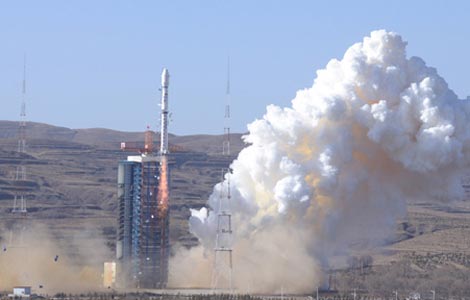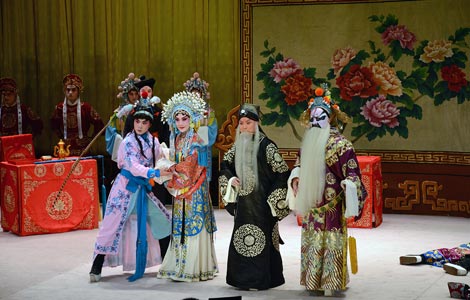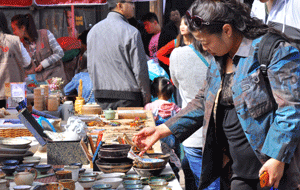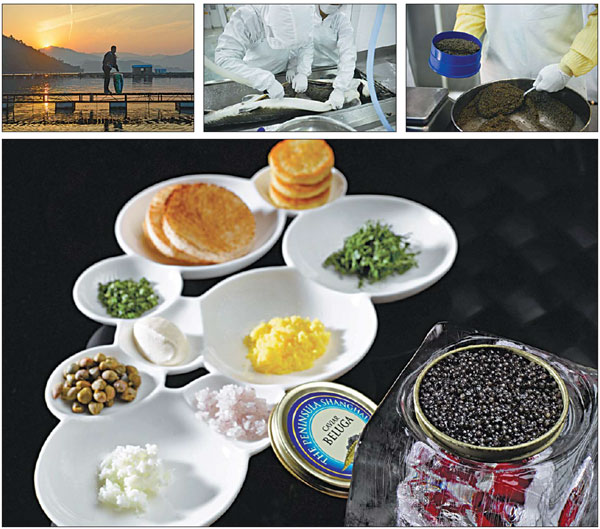'Black gold' a China treasure
Updated: 2014-12-08 07:01
By Zhang Kun in Shanghai(China Daily USA)
|
||||||||
Fish from Zhejiang are bearing caviar that is being sold all over the world.
Linen is starched and laid on the long table. Candles are lit and fresh flowers fragrant in the vase.
All is ready at the Rosamonde Aviation Lounge in Peninsula Shanghai, for the grand celebration of Kaluga Queen's first harvest of Beluga caviar.
|
Above: Kaluga Qeen carviar, grown in the farm of Qiandaohu in Zhejiang province. Below: The afternoon tea set with caviar at Peninsula Shanghai, which costs 3,688 yuan. Provided to China Daily |
Beluga is a fish of the sturgeon family that bears some of the finest caviar in the world, their roes the largest and smoothest, in colors of light to dark gray. The refined taste will linger in the mouth of a true caviar connoisseur.
It has taken 12 years of waiting for these fine little pearls to pop up in your mouth. A beluga sturgeon has to spend so many years before it grows mature to bear eggs.
And these fish, originally from the Caspian and Black seas, have grown up in the fresh water of China's Qiandaohu (Thousand-Island Lake) in Zhejiang province.
In 2014 the fish farm produced in total 30 tons of caviar, one-fifth of the global production and more than any competitor in the world, says Han Lei, vice-general manager of Hangzhou Qiandaohu Xunlong Sci-tech Co Ltd.
The company sells 90 percent of its caviar to the overseas market. On the first class flights of Lufthansa and other international airliners, at fine dining and gourmet shops in Europe and America, in luxury hotels such as Peninsula, Shanghri-La and Four Seasons, you may taste a serving of caviar of its brand Kaluga Queen, grown in the farm of Qiandaohu by Xunlong.
Chef Terrence Crandall of Peninsula Shanghai began using caviar from Qiandaohu at the opening celebration of Peninsula Shanghai. On that night alone he served 30 kg of caviar.
Lately the hotel has launched a new afternoon tea menu with caviar. One order of 30 grams of beluga caviar, hand-selected exclusively for the Peninsula Shanghai, will set one back by 1,888 yuan ($307).
Caviar is the eggs of a few species of the sturgeon fish family. It has been a coveted delicacy for more than 2,000 years, sometimes known as "black gold". Wild sturgeons used to be caught in Russia, Iran and other countries by the Caspian and Black Sea area, according to Chef Crandall.
The high price led to over-fishing, and after fishing for wild sturgeon was banned, a black market emerged, and eventually some fine restaurants and hotels had to remove caviar from the menu.
Scientists in China have researched the farming of sturgeons for many years. They discovered China's own wild sturgeon species named Kaluga, and cultivated hybrid sturgeons that combine the advantages of Kaluga and Amur sturgeon from Sino-Russia border.
Kaluga Queen is a successful fruit of their research. In 2003, the company brought some half-grown fish from the China Academy of Marine Science in Beijing to start its own fish farm on Qiandaohu.
Qiandao Lake is a reservoir built in the 1950s as part of a hydropower station. There is no industrial pollution and 87 percent of the land is covered by natural forests.
The water quality of Qiandaohu is so fine that in summertime the visibility underwater can reach as deep as 7 meters.
Kaluga Queen is the only company to pass the environmental evaluation to gain the license to build a fish farm on the lake.
Visiting clients and distributors can see clearly the sturgeons swimming in the giant tanks underwater.
"We have waste collecting systems to stop the excrement and leftover fish feed from polluting the lake," Han says. "And we don't need to put any drugs in the water."
The fine water quality has kept the fish healthy. Once they grow beyond three years, more than 99 percent of the sturgeons will survive till they bear eggs.
It takes at least eight years for a sturgeon to bear eggs. A sturgeon produces on average one-tenth the amount of eggs of its own body weight. The meat is often exported, mostly to Russia, says Shi Wei, a team leader in the caviar processing factory for Kaluga Queen in Quzhou of Zhejiang province.
The eggs are washed - no chemicals are used, only clean cool water - and then mixed with small amount of salt, and packed for international shipping. The whole processing procedures take place in less than 20 minutes, to keep the caviar fresh.
In three years' time Kaluga Queen plans to double its production to 60 tons a year. As global production rises, Han hopes the price will drop to a reasonable level and a healthy market will be developed home and abroad.
Chef Crandall is confident about Chinese consumers' interest in caviar. It's much like wine, he says. A few years ago people in China would only order wines from the most acclaimed vineyards but now they drink a greater variety. He believes the same thing will happen with the consumption of caviar.
Actually, some Chinese restaurants are already using caviar. Da Dong, for example, is an important client of Kaluga Queen. Caviar is served with its crispy duck skin, among other fine dishes.
Contact the writer at zhangkun@chinadaily.com.cn
(China Daily USA 12/08/2014 page10)

 China, Brazil pledge to promote science, technology co-op
China, Brazil pledge to promote science, technology co-op
 ZTE, NBA team partners in business, charity
ZTE, NBA team partners in business, charity
 'Big' Peking opera staged in New York
'Big' Peking opera staged in New York
 250 Santas hit slopes for charity
250 Santas hit slopes for charity
 Jack Ma awarded Honorary Chairman of Zhejiang Chamber of Commerce
Jack Ma awarded Honorary Chairman of Zhejiang Chamber of Commerce
 2014 Yearender: Life underground
2014 Yearender: Life underground
 South China's 'little Africa'
South China's 'little Africa'
 Trending: Eiffel Tower replica in Hangzhou
Trending: Eiffel Tower replica in Hangzhou
Most Viewed
Editor's Picks

|

|

|

|

|

|
Today's Top News
Illinois university signs agreements with Chinese college
ZTE, NBA team partner in business, charity
Chinese investors in Brazil told to avoid risks
Economists call for increased public spending in China
Xiaomi's smartphone taps into US market
Peruvian product hit in Chinese market
Chinese role expected in Mexico's energy reform
Brazil film festival delights Beijing and Shanghai
US Weekly

|

|








